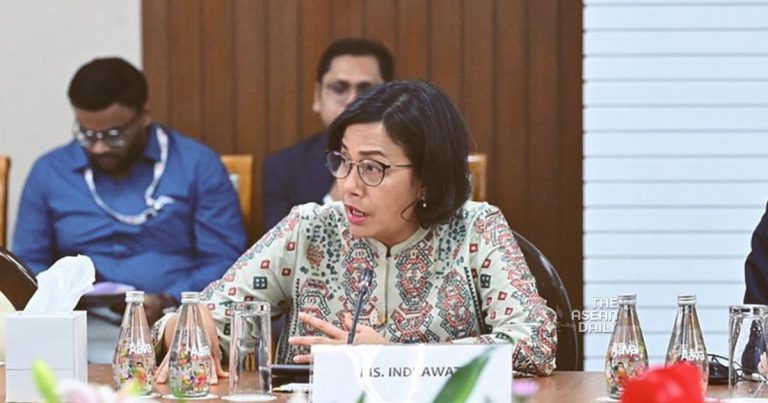6-2-2024 (JAKARTA) Several Indonesian ministers have reportedly expressed discontent with President Joko Widodo’s handling of social aid overspending and perceived partiality in the lead-up to the upcoming February 14 elections. Despite their concerns, these ministers are expected to remain in their positions to ensure government stability, according to sources who spoke with The Straits Times on the condition of anonymity.
One such minister is Finance Minister Sri Mulyani Indrawati, who is said to have privately conveyed her dissatisfaction to Ms Megawati Sukarnoputri, chairwoman of the ruling Indonesian Democratic Party of Struggle (PDI-P). Ms Megawati advised Dr. Sri Mulyani and other disgruntled ministers against resigning before the end of their terms in October, citing the importance of maintaining national stability.
Dr. Sri Mulyani, a respected veteran technocrat at the age of 61, is reportedly concerned about the impact of excessive social aid expenditure on her reputation and credentials. A recent cover page of Tempo newspaper depicted her as being involved in the imprudent use of state funds for political purposes.
The Indonesian government has intensified the distribution of cash handouts and rice packages since November 2023. In 2022, 460.6 billion rupiah (S$39.4 million) was allocated for social aid, compared to 496.8 billion rupiah in 2024.
Sources indicate that other PDI-P-affiliated ministers have also contemplated resigning due to President Widodo’s perceived favoritism towards his son Gibran Rakabuming Raka, who is running as a vice-presidential candidate alongside presidential candidate Prabowo Subianto in the upcoming election.
The Cabinet includes members affiliated with political parties, as well as non-partisan technocrats who may have close ties to certain political factions. Of the 34 Cabinet ministers, six belong to PDI-P, and several others maintain good relations with party chairwoman Megawati, including Foreign Minister Retno Marsudi and Dr. Sri Mulyani.
In light of strained relations between the ruling party and President Widodo, some PDI-P ministers have sought advice from Megawati following accusations that the President breached democratic norms and used his institutional privileges to favor the Prabowo-Gibran ticket in the three-way race.
Instances have been reported where supporters of PDI-P presidential candidate Ganjar Pranowo were restrained by security officers during rallies, and their posters were removed. Additionally, during a rally in Madura, East Java, third presidential candidate Mr. Anies Baswedan experienced a region-wide electricity blackout, which was promptly resolved as the event proceeded. Mr. Anies’ campaign team blamed state utility PLN for unprofessionalism, while PLN declined to comment when contacted by The Straits Times.
President Widodo’s alleged partiality has already led to the resignation of Mahfud MD, who served as chief security minister, on January 31.
One source highlighted that Megawati “fully understands that if ministers resign collectively, it would fuel instability, which would disproportionately affect the lowest-income earners.”
Yoes Kenawas, a research fellow at Atma Jaya Catholic University, noted that social aid has been used as a political tool in past Indonesian campaigns and elsewhere. However, this time, the magnitude of the increase in social aid surpasses previous instances. He added, “The aid even exceeded the amount given out during Covid-19, when we actually needed it the most.” On February 1, President Widodo announced a 600,000 rupiah cash handout for 19 million families to mitigate rising food prices, to be distributed before the February 14 election. A previous 200,000 rupiah cash handout, called the El Nino mitigation fund, was also provided.
The President personally distributed 10kg rice packs to locals in a village in Salatiga, Central Java. Mr. Yoes believes that this social aid will positively impact President Widodo’s approval ratings, consequently boosting the chances of the favored presidential candidate.
Recipients were reportedly informed that the handouts were “presidential aid,” although they were, in fact, government aid. Mr. Yoes emphasized that the funds used originated from the state coffers rather than an individual.
An anonymous senior government official revealed that Dr. Sri Mulyani also raised concerns about the reallocation of funds intended for other purposes to social aid.
Dr. Sri Mulyani, who previously served as finance minister from 2005 to 2010 during President Susilo Bambang Yudhoyono’s tenure, later held the position of World Bank managing director in Washington for six years until 2016. She returned to Indonesia and was appointed finance minister by President Widodo. Under her leadership, the ministry initiated efficiency measures to ensure more equitable spending and economic development.




